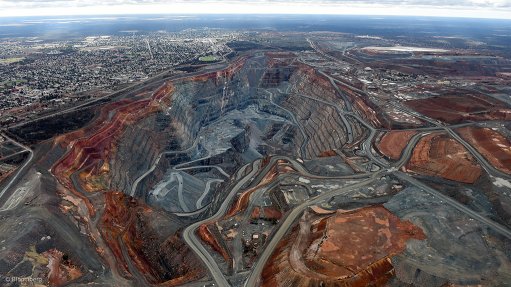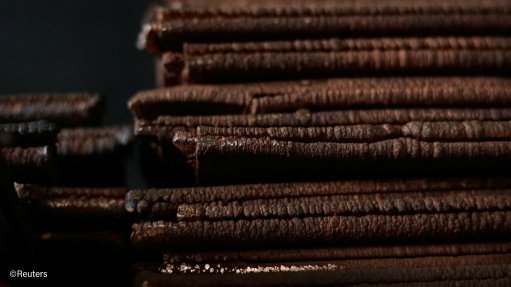Miners respond to Juukan Gorge report
PERTH (miningweekly.com) – Diversified major Rio Tinto on Thursday said that it was committed to learning from the incident at the Juukan Gorge rockshelters earlier this year, in order to ensure that such an event did not take place again.
Responding to the Joint Standing Committee on Northern Australia’s interim report into the destruction of the rockshelters, Rio has reiterated its apology to the Puutu Kunti Kurrama and Pinikura (PKKP) people.
“We recognise the destruction of the Juukan rockshelters caused significant pain to the PKKP people and we are working very hard to progress a remedy with them,” said chairperson Simon Thompson.
“As a business, we are committed to learning from this event to ensure the destruction of heritage sites of such exceptional archaeological and cultural significance never occurs again. We have made important changes to the way we manage cultural heritage sites and our relationships with Traditional Owners, including a commitment to modernise our agreements. We recognise the importance of ensuring relationships with Traditional Owners are built on partnerships based on mutual benefit, respect and trust.”
The interim report made a number of recommendations, including that Rio commit to a moratorium on mining in the area, undertake rehabilitation of the Juukan Gorge site, review all of its agreements with Traditional Owners, and stay all actions under the Aboriginal Heritage Act. The inquiry also urged other sections of the mining industry to make similar commitments, and has urged the Western Australian government to reform its state laws.
Rio on Thursday pointed out that since the destruction of the rockshelters, the company has worked with the PKKP on a rehabilitation programme for the Juukan 1 and Juukan 2 rock shelters and, is assessing ways to protect the area for the future. This includes extending a mining moratorium around the Juukan Gorge and establishing a purpose-built facility to store artefacts discovered during heritage preservation works.
The miner has also introduced a slew of other changes to ensure heritage sites of exceptional significance are preserved, including reassessing all activities that had the potential to impact heritage sites, with an immediate focus on those that could be impacted over the next 18 to 24 months, and implementing executive accountability for impacts on heritage sites where avoidance was not possible.
The company has also committed to modernise its agreements with Traditional Owners.
The Chamber of Minerals and Energy (CME) of Western Australia, on Thursday said that its member companies would consider the recommendations made in the interim report, but remained steadfast in support for the modernisation of Western Australia’s heritage legislation, and the role of the state as the primary regulator for Aboriginal cultural heritage.
“Aboriginal cultural heritage is an issue our sector takes extremely seriously and I’d like to thank the committee for that opportunity. The complexity of this issue is evident in the detail of the recommendations arising from the report and additional comments,” said CEO Paul Everingham.
“The ongoing reform of Western Australia’s Aboriginal cultural heritage legislation remains the number one priority for the sector. This is a critical piece of legislation and it’s important we get it right for future generations.
“We have made detailed submissions to all three phases of consultation of the reform process and had hoped that the draft Bill to replace the current Aboriginal Heritage Act would pass through Parliament this year. We remain committed to continuing to work constructively towards its progression in 2021.”
However, Everingham said that the CME fundamentally did not agree with a recommendation to strengthen federal oversight on Aboriginal heritage matters.
“Imposing another layer of regulation will not ‘fix’ issues identified, nor will it deliver any improvements to heritage outcomes in Western Australia. This would only duplicate processes and procedures that are best delivered at a local level with local stakeholders and remove the role of Traditional Custodians to make decisions about management of proposed impacts to their own cultural heritage.”
Everingham said a recommendation of a moratorium on Section 18 notices under the existing Aboriginal Heritage Act was a “blunt instrument” that would have wide-ranging negative community and economic impacts.
“It’s important people understand government approvals make up only one part of the work that companies do to manage impacts to land and heritage. There are many years of work that go on behind the scenes. As a consequence, many Section 18 applications cover activities that will have no direct impact on heritage values,” he said.
“It is not only the mining and resources sector which is granted approval for works under Section 18 notices. Agencies like Main Roads and local governments are some of the biggest users of these approvals, which are critical to the progress of major projects across the State.
“Western Australia is an attractive investment destination for many industries, partly because of the confidence offered by our stable political conditions. Recommendations for things like moratoriums have the capacity to erode some of that confidence.”
The Association of Mining and Exploration Companies (Amec) has also acknowledged the interim report, saying it was another important step in comprehending the incident at Juukan Gorge.
“The destruction of the 46 000-year-old caves at Juukan is a deeply saddening and regrettable event that has destroyed a site of enormous cultural and heritage significance, a site which cannot be replaced,” said Amec CEO Warren Pearce.
“The events at Juukan Gorge have rightly caused mining and mineral exploration companies to reflect on the processes, agreements and relationships that we have with traditional owners and aboriginal peoples.
“Amec members continue to work to ensure the highest standards are being met with Aboriginal Cultural Heritage.”
Pearce said that the interim report reflects the challenges that have been faced by the committee, as they have sought to understand the significant complexities of the interaction of state and Commonwealth legislation, the many different groups, companies and government agencies, a lack of consistency in process and agreements, and limited transparency of the processes and the outcomes.
“Amec supports the committee’s recommendation that gag clauses with traditional owners are not appropriate and should not be used in agreements.
“Amec opposes the committee’s call for a moratorium on Section 18s. A moratorium is not practical and does not consider the broader economic and social ramifications of delaying Western Australian development, including for Aboriginal people.”
“Amec and our member companies support strong protections for Aboriginal cultural heritage in legislation. In our view, a modernised legislative framework for the protection of Aboriginal Heritage in Western Australia presents the best path forward. Amec has supported, and will continue to support, the process to create a new Western Australia Aboriginal Cultural Heritage Act as it extends into 2021.”
Pearce said that the interim report is an important milestone for industry’s learnings from the tragedy at Juukan Gorge, and that the final report would present opportunities for all Australian jurisdictions.
Comments
Press Office
Announcements
What's On
Subscribe to improve your user experience...
Option 1 (equivalent of R125 a month):
Receive a weekly copy of Creamer Media's Engineering News & Mining Weekly magazine
(print copy for those in South Africa and e-magazine for those outside of South Africa)
Receive daily email newsletters
Access to full search results
Access archive of magazine back copies
Access to Projects in Progress
Access to ONE Research Report of your choice in PDF format
Option 2 (equivalent of R375 a month):
All benefits from Option 1
PLUS
Access to Creamer Media's Research Channel Africa for ALL Research Reports, in PDF format, on various industrial and mining sectors
including Electricity; Water; Energy Transition; Hydrogen; Roads, Rail and Ports; Coal; Gold; Platinum; Battery Metals; etc.
Already a subscriber?
Forgotten your password?
Receive weekly copy of Creamer Media's Engineering News & Mining Weekly magazine (print copy for those in South Africa and e-magazine for those outside of South Africa)
➕
Recieve daily email newsletters
➕
Access to full search results
➕
Access archive of magazine back copies
➕
Access to Projects in Progress
➕
Access to ONE Research Report of your choice in PDF format
RESEARCH CHANNEL AFRICA
R4500 (equivalent of R375 a month)
SUBSCRIBEAll benefits from Option 1
➕
Access to Creamer Media's Research Channel Africa for ALL Research Reports on various industrial and mining sectors, in PDF format, including on:
Electricity
➕
Water
➕
Energy Transition
➕
Hydrogen
➕
Roads, Rail and Ports
➕
Coal
➕
Gold
➕
Platinum
➕
Battery Metals
➕
etc.
Receive all benefits from Option 1 or Option 2 delivered to numerous people at your company
➕
Multiple User names and Passwords for simultaneous log-ins
➕
Intranet integration access to all in your organisation


















